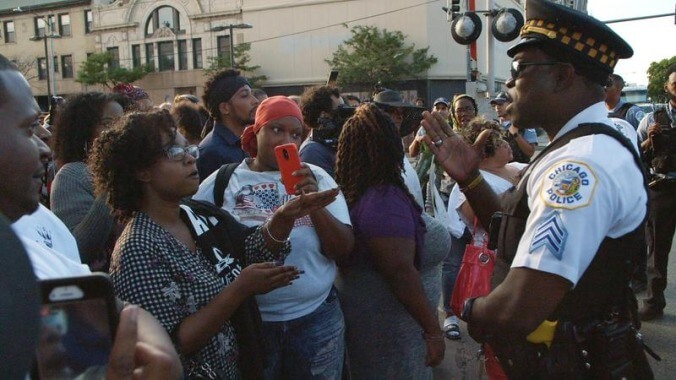

In order to appear on the ballot for mayor in the city of Chicago, a candidate must submit a petition with 12,500 registered voters’ signatures. This is significantly more than what is required by far larger cities, like New York and Los Angeles (3,750 and 500, respectively). It’s even more than what’s required to run for governor in Illinois or a seat in the U.S. Senate. And because the city requires 12,500 valid signatures, and rival campaigns can challenge them for any reason—usually, if kicking someone off the ballot would secure an advantage, or if they just don’t like them—it behooves candidates to submit well more than that.
In City So Real, Kartemquin Films’ docuseries chronicling the 2019 Chicago mayor’s race, director Steve James (Hoop Dreams, The Interrupters) dedicates nearly 30 minutes of its five-and-a-half hours to this ballot petition process, in all its excruciating and thrilling detail: from campaigns camping out outside city hall in order to be the first to submit, to the line-by-line objection of individual signatures on candidates’ forms. Conversations get heated. Lawyers are brought in. Not one but two candidates’ own mothers’ signatures are rejected. Forced to drop out due to an objection against his petition, activist Ja’Mal Green says at a press conference, “It’s only voices with money that matter.” Mayor Rahm Emanuel’s decision in 2018 not to run for a third term may have opened up the playing field politically speaking, with a staggering 14 candidates ultimately appearing on the ballot, but the message here is clear: The democratic process, and specifically Chicago’s byzantine version of it, is burdensome and exclusionary to all but the rich or connected.
Somewhere amid the frustration, James identifies another feeling, one that will be repeated refrain-like across City So Real’s five sprawling installments. After telling reporters of the absurd last-minute withdrawal of an objection, Board Of Elections spokesperson Jim Allen smiles and says, “Welcome to Chicago.”
Welcome to Chicago. It is what it is. That’s Chicago for you.
City So Real captures a love-hate relationship residents have with Chicago—at once a wry, begrudging acceptance of what could charitably be called its foibles and a passionate plea to make it better. While its ostensible focus is one of the city’s more interesting mayoral races in recent history, the series more broadly surveys the biggest problems the third-largest city in America faces and the people trying to solve them.
Police and gang violence, corruption, gentrification, the mass exodus of Black people from the city. James uses two major incidents as points of entry: the 2014 killing of Black teenager Laquan McDonald by white police officer Jason Van Dyke; and the proposal for Lincoln Yards, a 50-acre development for condos, apartments, and live entertainment on the city’s North Side. When City So Real begins, protesters anticipate Van Dyke’s verdict and sentencing, shutting down Lake Shore Drive while chanting, “Sixteen shots and a cover-up.” A city council meeting on the Lincoln Yards proposal is stormed by activists decrying the city once again prioritizing more affluent neighborhoods over those most in need. Joining them is the Jane Jacobs-quoting Tim Tuten, whose small but mighty bar and music venue, The Hideout, would be eclipsed by the skyscrapers and massive concert stadium that developer Sterling Bay plans to build across the street.
Meanwhile, the mayoral candidates jockey for position. More than their views or record, City So Real shows the day-to-day of local politicking. Entrepreneur Willie Wilson makes donations to Black churches during Sunday service. Tech start-up founder Neal Sáles-Griffin hands out tax receipts to University Of Chicago students. Federal prosecutor Lori Lightfoot shakes hands in the Metra station. For every moment of grandstanding or high-profile endorsement—from Chance The Rapper and Kanye to a former vice-president—there’s a lost iPad or a volunteer trying and failing to push their candidate’s sign into the ground (it’s too hard in the unforgiving Chicago winter).
Branching out from city hall, James and his crew also set up in bars, restaurants, and homes to hear what people think, and not just about the “blood sport” of Chicago politics. From the South Side to the North Side to the West, James follows residents as they go about their lives—a dog walker tending to his well-bred charges in River North, a Pilsen native playing pool—cleverly weaving in native news footage, as with a TV left on at a hardware store or playing in the back of a cab. The director indicates much through juxtaposition. A scene in which a Black Lyft driver breaks down in tears as she relates a racist incident she experienced is directly followed by former police superintendent and mayoral candidate Garry McCarthy telling his supporters how much it hurt when he was fired over the McDonald case. An intense but earnest debate in a South Shore barber shop over how to help troubled young Black men butts up against talk in another shop a handful of neighborhoods north, this one full of white ex-cops telling dirty jokes and saying that rioting is just what “they” do whenever one of “them” is shot.
The first four episodes of City So Real premiered in early March at the True/False Film Festival in Columbia, Missouri, and the fifth and final episode opens with the coronavirus taking hold in the spring, then protests against police violence erupting across the country. James returns to a number of the major characters from the first four hours, both online and in person. Sáles-Griffin and his mother deliver food to a relative, while another former candidate, organizer Amara Enyia, drops supplies off to community members who want to monitor their neighborhoods. The work goes on even if you aren’t elected mayor.
Beyond the uroboric disorientation of a documentary catching up to the present, it’s jarring when City So Real moves to a talking-head interview with now-mayor Lori Lightfoot. Something of its vérité egalitarianism feels stripped away. When an off-camera James asks whether raising the bridges to downtown during the height of the summer’s protests essentially pushed looting to the West and South Sides—predominantly Black neighborhoods—Lightfoot says, “It’s simply not true.” But she doesn’t give alternative reasoning, and James doesn’t press. “She checks all the boxes,” says radio host Maze Jackson. “Black, woman, LGBTQ. She gives the Democratic Party and white liberals everything they want all rolled up in one. It’s like Obama on steroids.”
The weight of so many of the country’s problems, all wrapped up in a single city, is palpable, but the filmmakers also leave space for lightness: A detour to the basement of city hall to show couples getting married. A man overcome by the sight of the Dread Head Cowboy and his horse. Two teenagers harmonizing in a backyard while a barber cuts hair. Cities aren’t great because of those who occupy their highest seats of power, but often despite them. James doesn’t offer solutions to the problems presented—how could he?—but lets the dark and the light exist alongside one another. Perhaps it is best summed up by a call-and-response Enyia leads on election night. As gracious in her defeat as she was during the campaign, she stands before her supporters, smiling proudly, and calls out, “All people. All voices. One city.” And the people say it back to her.
4 Comments
Can’t wait to see this. Kartemquin is a national (not just Chicago) treasure, as is Steve James. Hoop Dreams is better known, but The Interrupters is my favorite of the two films.
Dear lord. This review has been up for hours and this is the first comment?
This is the first I’ve heard of this, but now I’m pretty stoked to watch it. Pro Publica ran a piece earlier this year about how Lori is freezing out the alderman and consolidating power. She’ll be a true political boss in no time.
Hoop Dreams is one of the best movies ever, so I look forward to this.